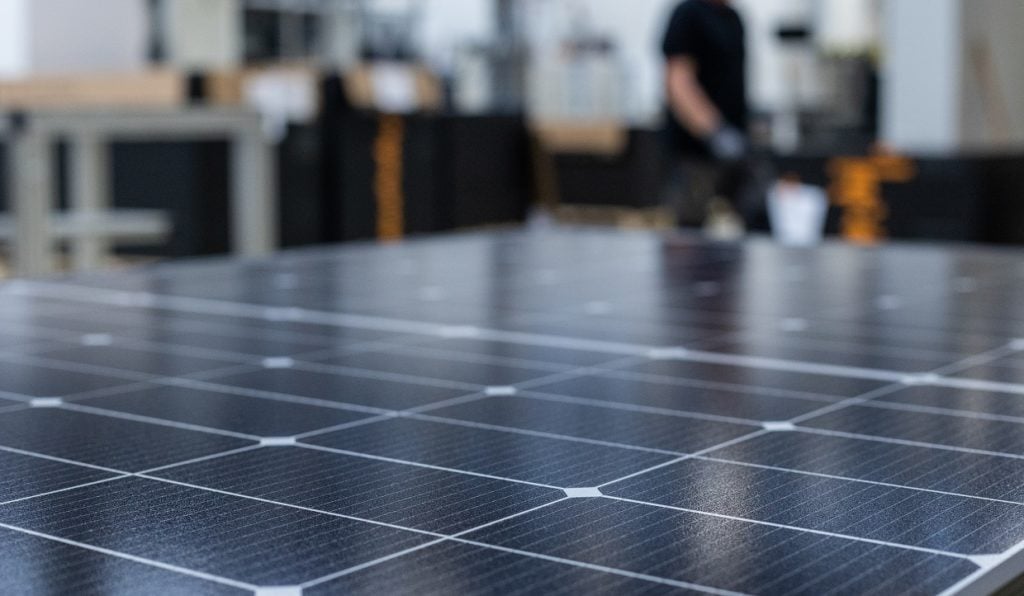
PV manufacturer Meyer Burger has planned to close its module assembly plant in Germany and focus on its footprint in the US.
The company cited a lack of sufficient measures to create a level playing field in Europe in terms of a resilience-reward scheme as reason for the closure. It said that “a final decision would have to be made” by late February.
Try Premium for just $1
- Full premium access for the first month at only $1
- Converts to an annual rate after 30 days unless cancelled
- Cancel anytime during the trial period
Premium Benefits
- Expert industry analysis and interviews
- Digital access to PV Tech Power journal
- Exclusive event discounts
Or get the full Premium subscription right away
Or continue reading this article for free
Mere days after unveiling the reception of equipment and tools for the Arizona plant, which will have an annual nameplate capacity of 2GW of heterojunction modules, the company is preparing to close the Freiberg plant as early as the beginning of April 2024. This will affect nearly 500 people.
Meyer Burger’s withdrawal from the module scene in Europe follows several other PV manufacturing companies in Europe which shut down their operations, such as REC Group and its polysilicon facility in Norway and Norsun, which halted its silicon ingot production in September 2023 but later unveiled plans to build a 5GW wafer plant in the US.
Despite passing the Net Zero Industry Act (NZIA) in November, the European Union’s goal to bring a domestic solar manufacturing industry within its borders is struggling.
Meyer Burger’s cell production in Thalheim, Germany, will not be affected by this decision and will continue, in order to support the ramp-up of the company’s module production in the US. Neither the equipment nor research and development sites in Switzerland and Germany will be affected by these measures and will continue to provide support to the company’s business outside Europe.
In parallel to this announcement, the company is looking to make strategic partnerships to accelerate the commercialisation of its technology which would allow for faster growth and strengthening of the US supply chain, while reducing the capital requirements.
Production in the Goodyear module assembly plant is expected to start in the second quarter of 2024, said Gunter Erfurt, CEO at Meyer Burger.
“Closing our state-of-the-art module production in Germany, which started production less than three years ago, is a decision we would like to avoid. But in the absence of long-time announced firm commitments by lawmakers on measures to create a level playing field, we are prepared to execute our restructuring plan in Germany,” added Erfurt.
In the long-term the company expects the US potential to be substantial, as shown with 5.4GW of offtake agreements so far.
Fiscal year in the red
Furthermore, Meyer Burger expects to end the 2023 fiscal year with an earnings before inflation, taxes, depreciation and amortisation (EBITDA) loss of CHF126 million (US$146 million). These are preliminary unaudited figures. The EBITDA was negatively impacted due to the underutilisation of the company’s production capacities in Germany, despite producing 650MW of solar modules but with lower sales.
The company ended 2023 with a cash position of nearly CHF150 million, however it will require CHF450 million before it becomes cash flow positive, which it expects in 2025 depending on the ramp-up of its US operations going according to plan.
Meyer Burger has several financing options available, and is currently in advanced talks with the German Federal Ministry for Economic Affairs and Climate Protection about Euler Hermes covered export financing.
The monetisation of future US tax credits, through Section 45X or advanced manufacturing production credit and a loan by the US Department of Energy – for which Meyer Burger passed the first assessment stage – is also in consideration. Finally, it is also looking at equity financing.
Overall, the US market remains the most attractive one for solar manufacturers, according to the company.
“The focus at this point is leveraging growth in the highly attractive U.S. market. Together with partners we could significantly enhance our position avoiding major capital expenditure. We would leverage and expand our technological leadership position, drawing on our R&D and equipment facilities in Switzerland and Germany,” said Erfurt.






